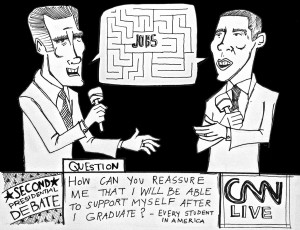Students deserve more attention
“Mr. President, Governor Romney, as a 20-year-old college student, all I hear from professors, neighbors and others is that when I graduate, I will have little chance to get employment. Can — what can you say to reassure me, but more importantly my parents, that I will be able to sufficiently support myself after I graduate?”
This question opened the second presidential debate Tuesday night, bringing up a topic that has been largely left at the margins of election season to the very center. Both candidates had an opportunity to take a stand for students and education. But both President Barack Obama and Republican presidential candidate Mitt Romney’s responses to Adelphi University student Jeremy Epstein’s question were disappointing.
Romney got the floor first and launched into a description of an initiative he launched while governor of Massachusetts — the John and Abigail Adams Scholarship, which provides the top 25 percent of public high school seniors four years of free tuition at any Massachusetts public college or university. No matter your political allegiances, this remains a valuable, laudable public education program.
It’s a great sound bite that demonstrates Romney’s commitment to higher education and one that appeals to student voters. So it makes sense that he referenced it off the bat. What doesn’t make sense, however, is how it would relate to Romney’s potential presidency.
Romney offered no plan to extend the scholarship to other states or transform it into a federal program. During the debate, he jumped to Pell grants — promising to increase them, although his education plan suggests he would reverse the scholarship funding that Obama has doubled during his administration — and then of course, jobs. He said he knows what it takes to create good, college-level jobs again and even told Jeremy: “I’m going to make sure you get a job.” But it’s unclear exactly how he’s going to do that, because he didn’t say.
Obama’s response was equally disappointing. He offered four plans that will ensure college students have a job when they graduate: build more manufacturing jobs, make sure “we have the best education system in the world,” invest in energy and reduce the deficit in the most balanced way possible.
These are all big-picture ways to reassure college students that we’ll enter a stronger economy when we graduate, but they’re more political talking points than genuine student-centric promises.
Interestingly, it took a totally unrelated question to get Obama to really comment on the state of education. He took a question about gun control and turned it into an education issue, saying that beyond gun control policy and regulation, what we really need to do is stop gun violence at its root causes — one of which is failing schools. Though this is the kind of forward thinking we need for true education reform, it shouldn’t take a separate topic to bring it up.
Obama’s record on education hasn’t been perfect, and his opening response to Epstein — and all college students, in a way — was, like Romney’s, not what students needed to hear. With only 18 days left until Election Day, this is crunch time for the candidates to sway undecided voters — many of whom are young people who rallied behind Obama four years ago and are now unsure if they even want to vote. Both candidates are missing out on opportunities to sway a huge voting bloc. Obama and Romney should pay more attention to students and the issues they care about. It sounds trite, but we have to keep saying it until they actually do.
Elena Kadvany is a senior majoring in Spanish and is the Daily Trojan’s Editorial Director. Her column “Beyond the Classroom” runs every other Thursday.


All you students have already had your income abridged and promised to the elderly. 4% medicare, 16.5% social security. Good luck paying back your student loans.